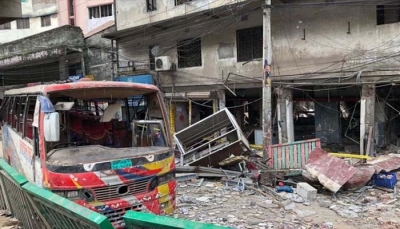In the seventies the China backed Pol Pot regime turned farms into "killing fields" in strife-torn Cambodia, resulting in a Hollywood starrer that went by the same name. Fast forward to the second decade of the 21st century, and people are once again dying at the workplace on an industrial scale. The difference between now and what happened half-a-century ago is that factories, instead of the farms, have become venues of the insane tragedy.
Also instead of Cambodia, the victim country this time is Bangladesh. The common factor of course is China.
The massive fire that broke out at a factory in Bangladesh’s Narayanganj killing at least 52 people last week has been a wake-up call for the South Asian nation. The incident highlighted how several Chinese have been running factories illegally in the country.
Also read: 52 people dead in massive fire at Bangladesh factory: once again questions rise over safety
A report carried by the Economic Times said for the last seven years illegal factories have been established in Bangladesh for manufacturing batteries. “These factories are run by Chinese businessmen,” the newspaper said.
The report also noted that the Narayanganj Moukuli Bazar factory which was earlier a textile mill was converted into a battery manufacturing unit illegally. It has been running for the last four years without any signboard outside the factory and “nobody knows the name of the battery.” “The people in nearby area are aware that this factory belongs to Chinese businessmen,” it said.
According to news agency ANI, Chinese nationals in Bangladesh are not allowed to purchase land.
“The Chinese typically seek help from the locals for setting up their units and these are illegal. The real names of the promoters are naturally buried while in case of problems, the locals are harassed,” a person familiar with the trade told India Narrative. He also said that many Chinese have been setting up their factories in Bangladesh due to the cost advantage.
Also read: Hit by allegations of embezzlement, China forced to withdraw from rail projects in Bangladesh
Most of these illegal units provide no safety net to the workers.
Fires have been common occurrences in Bangladesh.
At a time, when Bangladesh is looking to attract more foreign direct investment not just in the readymade garment sector but also in other areas, the Sheikh Hasina government will need to rejig labour laws with a fool proof safety mechanism of workers weeding out illegal elements.
The International Labour Organisation had earlier observed that “most of the factories do not meet standards required by building and construction legislation. As a result, deaths from fire incidents and building collapses are frequent.




















